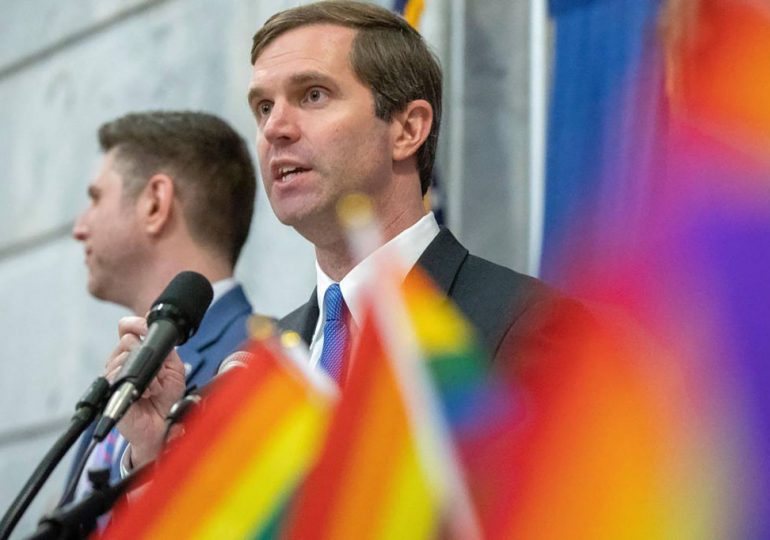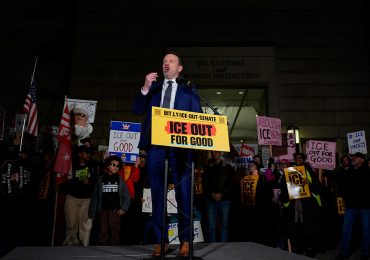Kentucky Gov. Andy Beshear on Saturday vetoed a bill seeking to overturn his Executive Order banning conversion therapy—a practice that attempts to alter a person’s sexual orientation or gender identity. But legislators pushing to legalize the controversial practice in the state may still get their way.
Kentucky Republicans, who will meet Thursday to mark the end of their legislative session, are expected to overrule the governor’s veto, adding to the mounting score of attacks against LGBTQ+ people— especially youth—that has intensified over the past few years. More than 500 anti-LGBTQ+ bills have been introduced in state legislatures for the 2025 legislative session, according to the ACLU’s legislative tracker.
[time-brightcove not-tgx=”true”]
“What we’re seeing now is the result of a re-energized coalition of groups—all of which are conservative—particularly enhanced at this moment by threads of Christian nationalism,” says Michael Bronski, a Harvard professor who specializes in gender studies.
As legislative sessions across several states come to a close, experts do not expect a domino effect of state legislation seeking to overturn conversion therapy bans in the 23 states that have them. “States are more likely to go about the question in a slightly different way,” says Cathryn Oakley, senior director of legal policy at the Human Rights Campaign.
Read More: Reverends: Trump’s Anti-Trans Attacks Are Un-Christian
Oakley expects to see states “conflating the critical distinction between the effort to ban conversion therapy—which prohibits fraudulent, abusive practices that fly in the face of medical recommendations—and the effort to prevent transgender adolescents from receiving best-practice, medically-supported, evidence-based transition-related care.” The Supreme Court this year will deliver a decision on U.S. v. Skrmetti, which challenges Tennessee’s ban on gender-affirming-care for youth and could also restrict care for adults.
Conversion therapy has been discredited by medical organizations such as the American Psychological Association and the American Academy of Child and Adolescent Psychiatry, who have called the practice both ineffective at changing a person’s identity, and harmful.
Youth who were exposed to conversion therapy are more than twice as likely to report attempting suicide, according a peer-reviewed study by the Trevor Project, published in the American Journal of Public Health. Of the LGBTQ+ youth who attempted suicide in 2023, nearly 30% of them were subjected to conversion therapy, according to the Trevor Project’s 2024 national survey on the mental health of LGBTQ+ youth aged 13 to 24. Conversion therapy is also linked to greater symptoms of depression and post-traumatic stress disorder, according to a 2024 study by Stanford Medicine researchers.
There is no nationwide ban on conversion therapy. But even though nearly half of the U.S. has laws banning the practice, it is still happening across the U.S., with registered therapists in every state except Hawaii and Vermont, as of 2023. Some conversion therapists have been able to skirt bans by advertising their services as “reparative therapy,” or promising to help patients deal with “unwanted same-sex attraction.”
Experts say the ideology behind conversion therapy is also part of the rhetoric behind anti-trans legislation. “You can only ban access to health care that doctors and parents want for their transgender kids if you believe that their gender identity can be changed,” says Casey Pick, director of law and policy at the Trevor Project, a suicide prevention organization for LGBTQ+ youth. “The anti-trans belief structure of conversion therapy has been the unspoken participant in all of this anti-trans legislation.”
Earlier this March, the Supreme Court announced it will hear Chiles v. Salazar, a case challenging Colorado’s conversion therapy ban. The Alliance Defending Freedom, which has been designated as an anti-LGBTQ hate group by the Southern Poverty Law Center, is representing plaintiff Kathy Chiles, a licensed counselor who argues that the ban censors her free speech. The U.S. Court of Appeals for the 10th Circuit ruled in favor of the state, upholding the ban due to the harms of conversion therapy and alleging the law advises over therapists’ conduct.
But the 11th Circuit Court of Appeals has ruled differently. In 2020, the court said that the free speech rights of conversion therapists were being infringed upon by a ban, enjoining bans on conversion therapy in three states—Alabama, Georgia, and Florida.
The Alliance Defending Freedom did not respond to TIME’s request for an interview.
Some experts optimistically view the upcoming Supreme Court case, in which a ruling is expected in June 2026, as a chance for the nation’s top judicial body to stand against conversion therapy bans, especially given the circuit split. “There’s some disagreement within the many courts that have upheld the bans as to what the legal rationale is. So it may well be that the court can take a look at this and find that prohibiting these dangerous practices is entirely consistent with hundreds of years of tradition and practice in this country of regulating medical conduct,” says Pick. And she maintains that conversion therapy bans have been largely bipartisan, passing in states with Republican governors.
Read More: I’m a Veteran. Trump’s Trans Military Ban Betrays Our Troops
The Trump Administration, however, has acted swiftly against the transgender community, passing Executive Orders limiting their ability to change gender markers and access gender-affirming-care. Democrats last re-introduced a federal conversion therapy ban in 2023, before Republicans took control over both chambers of Congress, though the bill did not move forward.
The goal of both the Administration, and Republicans, Bronski says, is clear. “The attack on transgender people, which is devastating, is actually the beginning of the attack on other groups,” he says. The “larger project,” particularly with acts like conversion therapy that seek to make someone cisgender or straight, is the “simple eradication of queer visibility.”
If you or someone you know may be experiencing a mental-health crisis or contemplating suicide, call or text 988. In emergencies, call 911, or seek care from a local hospital or mental health provider.
Leave a comment








